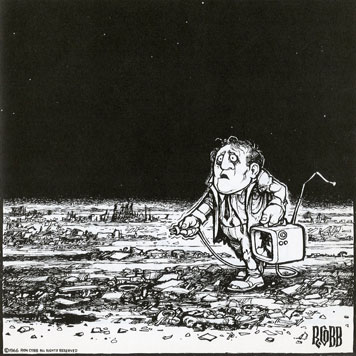From the Department of No Shit, Sherlock:

Crowded Field
Derek Thompson points to the elephant in a post at TheAtlantic.com.
Citing the increasing saturation of the streaming music market (where any more than one or two services qualifies as saturation), Thompson points to the elephant that has been in the room since… well, since the first Real Audio player made streaming music a reality in… what, 1996?:
…what isn’t there room for in music?
Buying it.
“Young people today don’t buy music anymore,” said Martin Pyykkonen, an analyst at Wedge Partners. The numbers agree.
I suppose my objection here should be something along the lines of “whatchyou mean ‘young people’, Kimosabee?”
Or maybe I should take it as a compliment that somebody thinks 63 can qualify as ‘young’ – particularly since I just bought tickets for a movie tonight at the reduced fare for ‘seniors.’ But I digress…
I have been arguing for years that the ‘unit purchase’ model for music – whether it’s physical products like CDs (or, yes, even the revered, resurrected vinyl…) or virtual units delivered as purchased downloads – has been on the wings of the dodo for years, and that any assertions to the contrary are an exercise in viewing the future through the rear view mirror (if you don’t know what I’m talking about, I sincerely implore you to click the link and find out).
And no, the fact that I’m engaged in a project that is about to release its third physical product at the same time that I’m predicting the demise physical products is not lost on me. I write these things because I think I’m observant, maybe even a tad prescient. I never said that made me invulnerable to also being a hypocrite. Such is the nature of living on a cusp. But there I go again, digressing…
As Thompson reports, the handwriting is on the wall, the die is cast, the nails are in the coffin. Pick your metaphor, but this is we see when we turn the car around and start steering through the windshield:
“…digital music sales fell last year for the first time ever, by 6 percent, as the music business inches closer to an access-over-ownership model. Overall streaming (which includes digital radio) is up 32 percent to 118 billion song streams in 2013. On-demand streaming (e.g. pick and click a song on Spotify) doubled last year.
Meanwhile, we have Tommy Silverman and others at the annual Austin TX Spring Break Clusterfuck known as “SXSW,” (that’s pronounced “ess-ex-ess-doubleyew) professing to possess the keys to a $100-billion kingdom with a more colorful metaphor of his own:
This enema that we’re going through is making us realize that our business is much bigger than what we thought it could be,” Silverman said. “We’re in the attention business now.”
And the nominees for the 2014 ‘Masters of the Obvious’ award are….
Silverman etal be right, the entirety of the recorded music business could certainly be much larger than the rapidly-shrinking single-digit-billion-dollar business it has recently been reduced to.
I’ve done this math for you before: A couple of years ago the NPD group estimated that the average music ‘consumer’ spends a paltry FORTY dollars per year on music purchases (that figure is surely even less now). That expenditure adds a bountiful 30 or 40 new tracks to their record collection every year. Now persuade those tight-fisted consumers that for only TEN DOLLARS (per month…) they can have the entire history of recorded music – past-present-and-future – at their disposal, and you can effectively triple or even quadruple your aggregate industry top-line.
Of course, that’s assuming they have any money left after paying for their cell phone, cable teevee, broadband internet and Clover brewed coffees at Starbucks (which I am drinking as I write & post this…)
It may not add up to the $100-billion that Silverman is hallucinating, but it could be considerably more than whatever the current figures are.
But whatever the figures might be, we will never realize the full potential of any future business model until we stop trying to drag the old models long with us. I don’t care if your fancy new “human-powered” streaming music service is called “beats,” It does no good to beat an internal combustion engine with a buggy whip.
But there’s another message in all of this that I think has been overlooked, and that’s all this emphasis on recorded music. That’s the biggest buggy whip that we’re dragging along with us, the biggest thing that looms in that rear view mirror.
As long as we’re focused on how to preserve or grow the recorded music business, we’re going to miss the point of what Silverman inartfully calls “this emema” that the industry is going through.
What we cannot see so long as we’re driving backwards into the future, surveying the landscape in front of us through the rear view mirror (really, try to get that image in your head…), is that the ‘future of music’ is much less about the recorded music than it is about the way that music lived before it became any kind of product – back when music simply did not exist unless there was somebody in the room playing it for you, which person was often yourself and your friends.
The future of music is not any kind of product, physical or virtual, delivered by truck, download, or stream. It’s much more… organic, and ‘aural’ than that. But until we’re a little further removed from the product era, it’s going to be hard for most people to appreciate that prospect.
The idea was never more succinctly put than during a conversation I had with Scott Huler, one of the presenters at last year’s TEDx Nashville.
“I tell my kids,” Scott said, “that music is not something you buy. It’s something you make.”
I don’t care how many billions Tommy Silverman thinks the ‘music industry’ can be, those children are the future.












